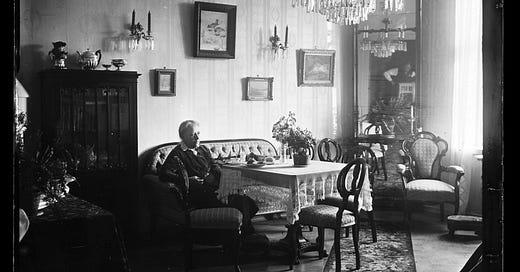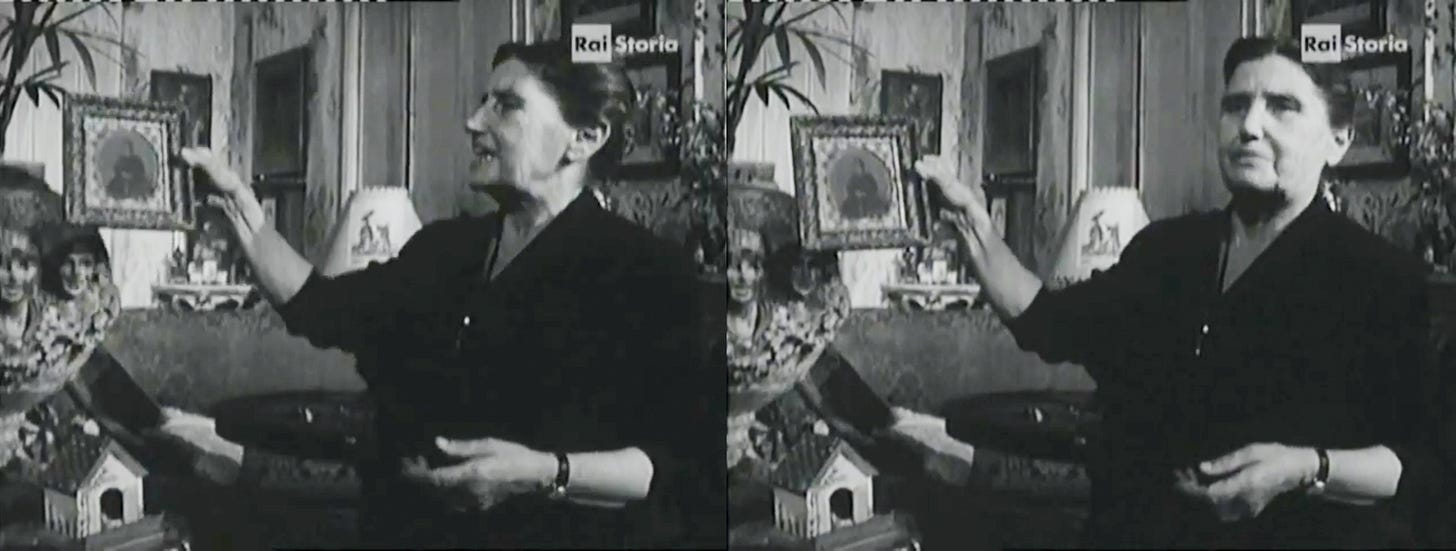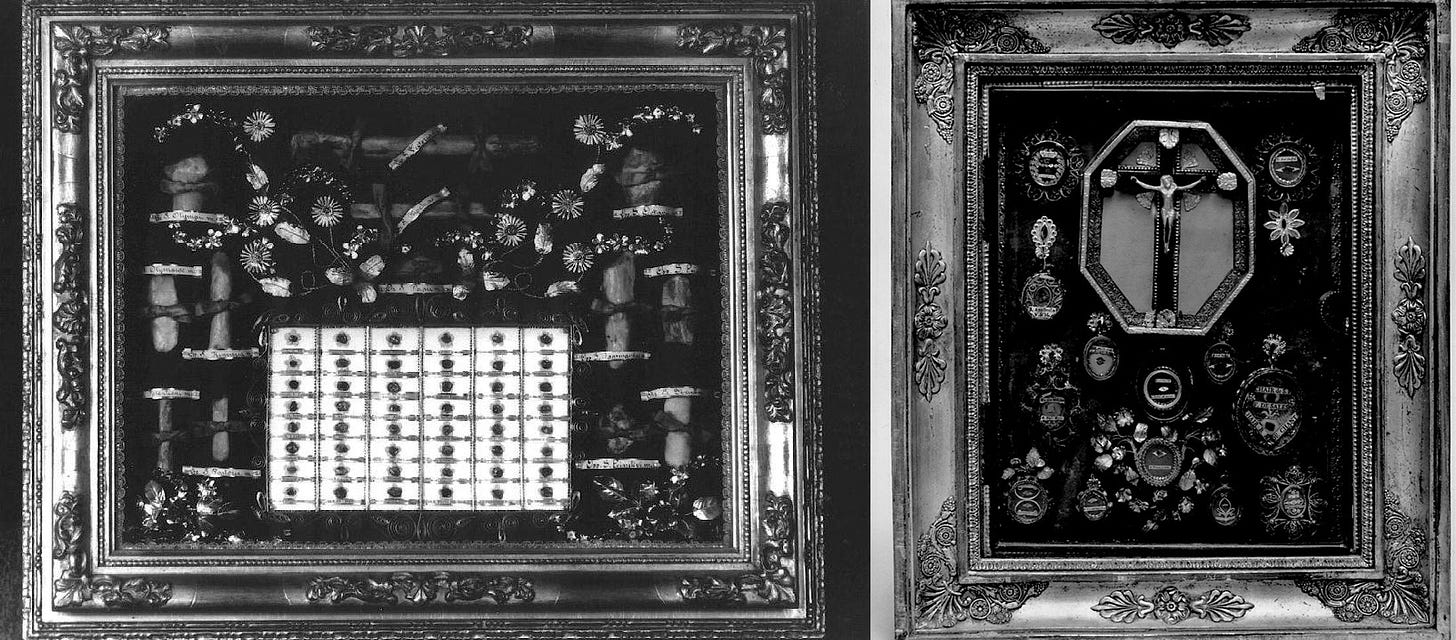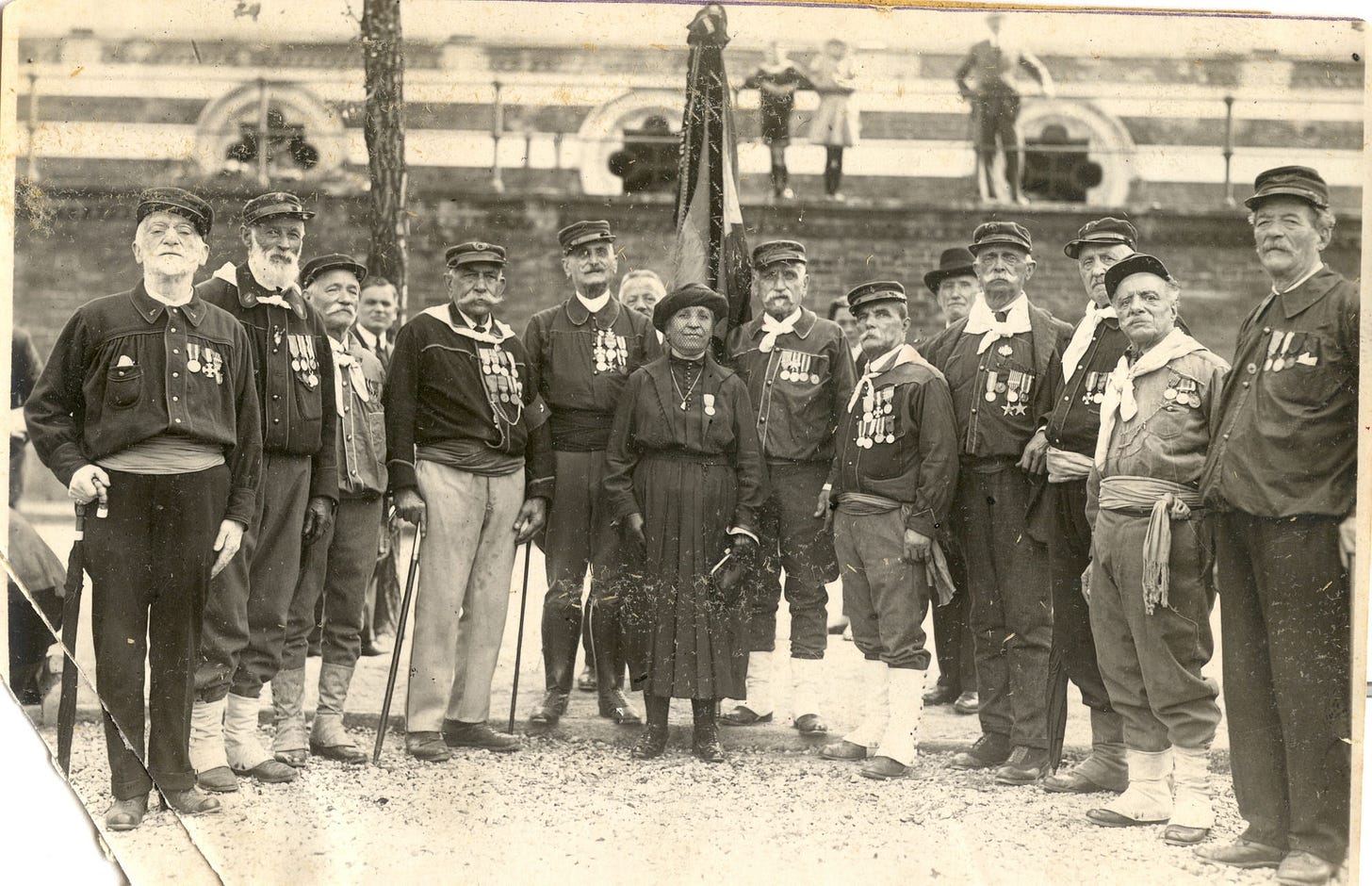Well, folks, here we are, this is my last entry for The Leopard. I’m just going to plunge in, and I’ll leave you some more notes at the end.
Shall we?
Maiden aunts
You won’t be too surprised to learn that the Salina (or rather, Tomasi) sisters did exist in real life. Unfortunately, I can’t find much about them: while the Leopard’s male heirs are duly listed and accounted for, it seems like the girls — and the unmarried ones especially — slipped through the cracks of history.
One rare testimony comes from a 1960 television special about the author. Remember Chiara, Fabrizio’s youngest daughter? Of course you don’t, she’s only ever mentioned in this last chapter when Carolina writes a letter to her married sister in Naples. Chiara’s daughter briefly appears on the TV special and, when asked about her notorious grandfather, she slips in some words about an aunt too:
“See this one? This is Aunt Carolina, the eldest daughter. She was all church, all prayer. Well, she didn’t want to marry, she dedicated herself to religion instead.
I find it both moving and frustrating that the Tomasi sisters would have been forgotten today if not for their nephew. Lampedusa was fourteen in 1910 and, apparently, his great-aunts fascinated him enough to try and guess what was hiding behind the bundle of black silk and white hair. I wonder if he was the very nephew that nicknamed Concetta “Catherine the Great” – the juxtaposition between spinster auntie and promiscuous empress makes for a very Lampedusian contrast.
Toys to keep the children quiet
The first chapter of The Leopard is set on May 13th 1860; the last chapter, on May 13th 1910, exactly 50 years later. The setting is the same too, Villa Salina, and specifically the room with the painted monkeys and parrots. Chapter one was an ouroboros that begun at the end and ended at the beginning. Lampedusa now draws another perfect circle just before the finish line, highlighting once again the main paradox of the book: nothing has changed but everything has. Time is a loop, and still we’ve reached the end.
By now, the house is chock full even more ghosts and relics of the past, both dead and alive. The three sisters are described as elderly little girls, clueless about the world, throwing tantrums when things don’t go their way. Do you remember Carolina and Caterina? They were at the ball too, freezing out potential suitors with their shyness. Now Carolina, the eldest, is a Christian zealot with a very simple understanding of religion and a bone to pick with the Pope (you still meet plenty of people like that on social media). Along with her little sister Caterina, paralyzed and prone to tears, she has been squandering money buying fake relics from a local scammer.
Today the poor signorinas have to endure the hustle and bustle of a gaggle of priests, determined to defile their private chapel and spoil their fun. The issue (other than the dozens of creepy little bones the girls have been collecting) is a secular painting they mistook for a Madonna. Long gone is Fabrizio’s talent for spotting foxy ladies! His daughters, that he himself educated with edifying novels and daily rosaries, have scraped the naked gods from the ceilings and kept intact their virginal innocence. Time has indeed stopped for them, they haven’t grown up in fifty years.
Mummified memories
Concetta’s current existence is, if possible, even more depressing than her sisters’. Much smarter than them, she can see right through their religious fervor, but still she indulges them with the same indifference her father used to show her. Concetta is still a true Leopardess, and the very last of her kind. She has easily become the master of the house – too bad there’s nothing left to rule over. Money is gone, power is gone. Only reputation remains, and so she cultivates her devout Catholic persona; she’s not particularly religious, but that’s the one aspect of life where the Leopard can still, somewhat, shine.
Concetta didn’t cry when her father died, and she doesn’t cry still. Grief gets to her slowly, as if she’s living inside a bubble. Or maybe she’s in such constant pain that she can’t tell the difference anymore. She doesn’t read, she rarely goes out, she just contemplates her own misery. Her room looks like the lovely den of a harmless little aunt, but to her it’s hell on Earth. It's haunted by demons that she keeps locked inside with her out of pure spite. The walls are populated with portraits of old enemies she refuses to forgive. (Including Fabrizio. Especially Fabrizio.) Four giant boxes contain her own relics, the trousseau she never got to use, yellowing in the tyrannical Sicilian heath.
And then there's Bendicó rotting on the floor. Once upon a time he was the most alive creature in the family, and even then he carried a name in the past tense. All the Salinas have always been dead, ghosts from the author's past and ghosts in the making during their brief time on Earth. Bendicó was always a metaphor for Fabrizio's mortal body, the wild, passionate side of the Leopard. Fabrizio is no more but a part of him still hangs behind, unnaturally preserved by Concetta’s stubbornness. The sensual garden is now kept firmly out of the window, and Bendicò, so fond of it in life, has never gotten to join its natural cycle of decay and rebirth.
The truth
While villa Salina rots, nearby villa Falconeri, once the site of Tancredi’s ruin, thrives. At least apparently. Tancredi himself has been dead a few years, leaving Angelica alone with his ghost. Despite their unhappy marriage, they shaped each other so deeply that Angelica still preserves her late husband’s mannerisms. Lampedusa is relentlessly bleak when describing Angelica’s fate: in three years an illness will turn her into a larva (these are his exact words in Italian), it’s already in her bloodstream and she doesn’t know it yet.
Angelica and Concetta, whose lives have been so different and whose fate will be the same as everybody else’s, share the enthusiastic friendship that Italians and Austrians will have during War World One. (Yes, they were on opposite fronts. Yes, it’s another fabulous historical pun.) More importantly, they share the ghost of Tancredi, which links them indefinitely.
On the 50th anniversary of Garibaldi landing in Sicily, their domestic necromancy is joined by a new face: sprightly old man Tassoni, one of Tancredi’s comrades in the Redshirt army. He has never met Concetta before, and yet he’s one of the people who shaped her life the most. On the fateful night when Angelica joined their dinner in Donnafugata, Tancredi told a story about storming a convent with his pal Tassoni and harassing the nuns inside. Concetta never forgave him for that – or rather, she never forgave him for choosing Angelica over her; Tassoni and the nuns were only the perfect excuse.
Except, that story never happened. Except it was just a swashbuckling tale a boy came up with to impress a girl. Eighteen year old Concetta gave up on her life that night, and seventy year old Concetta, who has been roaming villa Salina like the living dead for half a century, is left to pick up the pieces, to someway, somehow come to terms with a personal narrative that has now inevitably changed.
Concetta is faced with both the ugliness and the futility of her own anger and resentment. She has to reevaluate all her past actions and relationships, including the one with her own father: she had cast him as the main villain of her story, but was he really? Or was he just a tragic lost soul, exactly like herself? Were they both victims of the Leopard’s insatiable pride?
That realization is enough to send anyone’s head spinning. And it’s quickly followed by an even more devastating one: Concetta is never going to know. The dead stay dead and keep their truths buried with them. What’s the truth anyway? It hardly leaves a person’s mouth and it’s already a tale for everyone else’s to play with. You’ve just read two hundred pages by a man making up stories about his ancestors, but you’re never going to know what Fabrizio was really like, what Concetta was really like.
The last scene of the book is, of course, emblematic. Concetta finally gets rid of Bendicò’s stuffed body and the poor mangled thing, thrown out of the window, looks for a fleeting moment like the rampant Leopard. Concetta has severed the last umbilical cord keeping her tethered to her father and a glorious past that was already rotting the day she was born. At long last, Fabrizio is no more.
Or is he?
Didn’t we just read a whole book about him?
You guys, thank you so much for sticking around. This has been truly and adventure and a commitment, I’m rather proud of what I achieved and I’m grateful for all your comments and engagement. I hope this adventure has enriched your life a little. It surely has mine.
What’s next for Pomus Aureus? A Christmas break, for starters! I definitely want to tackle a book or two (or three!) in 2025, I’ll make a poll at the start of the year, so if you have any suggestion, any Italian book you particularly want to read, send them my way. We’ll pick our next title together.
Once again, THANK YOU!









Fabulous notes and pictures, as always. Thank you so much. Well, what a brilliantly bleak ending for a marvellous book. Poor Concetta. Her whole life a fake (just like those relics) based on believing a made-up story. And poor Angelica. All that vital beauty and energy, ultimately unloved, alone and destined for an unpleasant death. Thank goodness that at least Bendico was finally released from his perpetual prison, unknowingly making a valiant leap through the air to be reunited with nature. What struck me most about this chapter was how futile our own choices are (in Lampedusa’s eyes). Concetta and Angelica make very different life choices, they are opposites in every way, one cerebral, one sensual, one old money, one nouveau riche, virginal and married - but they both end up in exactly the same place. Whichever route you take, you end up old, lonely and watching your world decay. What a happy thought! 😂 Thank you for this fantastic readalong. It’s been a great experience and I look forward to more Italian reads in 2025. I hope everyone has a merry and peaceful Christmas break 🌲💖🇮🇹
It's quite a devastating final chapter. But what an incredible novel - thank you Ellie for guiding us! You made the reading experience really exceptional.